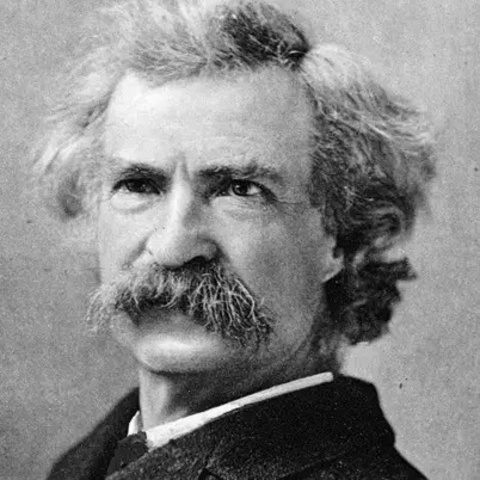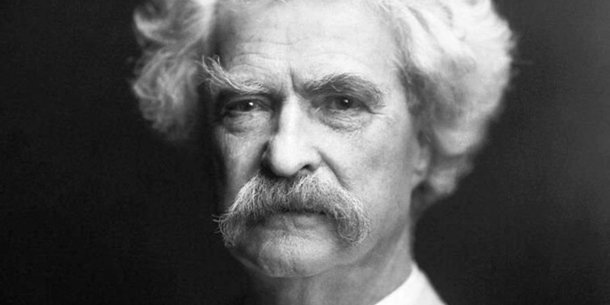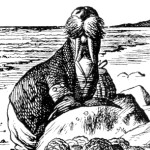If Cooper had any real knowledge of Nature’s ways of doing things, he had a most delicate art in concealing the fact.
It’s Wednesday. Which, as I’ve doubtless observed (complained about/whined over) in the past, is not my favorite day of the week. So I’m in the mood for something cathartic. (Translation? I’m on the lookout for something mean. Because misery and company and all that.)
And so, in an effort to put this particular Wednesday well-and-truly to rest, I’m going with what is probably the single meanest-and-funniest thing I’ve ever seen: Mark Twain’s analysis/take down of the works of James Fenimore Cooper, “Fenimore Cooper’s Literary Offenses.”
Here’s a particularly wonderful and cold-hearted bit — both because it’s such a stinging (and valid, I feel) criticism of Cooper’s style, and because it’s delivered in the very same manner as the thing Twain is criticizing:
The conversations in the Cooper books have a curious sound in our modern ears. To believe that such talk really ever came out of people’s mouths would be to believe that there was a time when time was of no value to a person who thought he had something to say; when it was the custom to spread a two-minute remark out to ten; when a man’s mouth was a rolling-mill, and busied itself all day long in turning four-foot pigs of thought into thirty-foot bars of conversational railroad iron by attenuation; when subjects were seldom faithfully stuck to, but the talk wandered all around and arrived nowhere; when conversations consisted mainly of irrelevancies, with here and there a relevancy, a relevancy with an embarrassed look, as not being able to explain how it got there.
Want more? There’s more. Lots of it. And deliciously vicious, every word.
We must be a little wary when Brander Matthews tells us that Cooper’s books “reveal an extraordinary fulness of invention.” As a rule, I am quite willing to accept Brander Matthews’s literary judgments and applaud his lucid and graceful phrasing of them; but that particular statement needs to be taken with a few tons of salt. Bless your heart, Cooper hadn’t any more invention than a horse; and I don’t mean a high-class horse, either; I mean a clothes-horse. It would be very difficult to find a really clever “situation” in Cooper’s books, and still more difficult to find one of any kind which he has failed to render absurd by his handling of it.
…
The ark is one hundred and forty feet long; the dwelling is ninety feet long. The idea of the Indians is to drop softly and secretly from the arched sapling to the dwelling as the ark creeps along under it at the rate of a mile an hour, and butcher the family. It will take the ark a minute and a half to pass under. It will take the ninety foot dwelling a minute to pass under. Now, then, what did the six Indians do? It would take you thirty years to guess, and even then you would have to give it up, I believe. Therefore, I will tell you what the Indians did. Their chief, a person of quite extraordinary intellect for a Cooper Indian, warily watched the canal-boat as it squeezed along under him, and when he had got his calculations fined down to exactly the right shade, as he judged, he let go and dropped. And missed the house! That is actually what he did. He missed the house, and landed in the stern of the scow. It was not much of a fall, yet it knocked him silly. He lay there unconscious. If the house had been ninety-seven feet long he would have made the trip. The fault was Cooper’s, not his. The error lay in the construction of the house.
Cooper was no architect.
Legendary stuff. And rightfully so. Small wonder it’s hovers near the top of my Twain list. (Might even be at the top, though I need to re-read “Eve’s Diary,” “A Medieval Romance,” and “The Invalid’s Story” before I can say for sure. There something about his particular brand of sarcasm that just gets to me. Yes, this tells me something about myself. No, I’d rather not talk about it.)
But Twain’s not just a hater. He provides some constructive criticism, as well. Here, he runs down a list of writing rules that Cooper’s violating, so we readers/writers will be able to avoid them ourselves in the future.
In addition to these large rules there are some little ones. These require that the author shall:
12. Say what he is proposing to say, not merely come near it.
13. Use the right word, not its second cousin.
14. Eschew surplusage.
15. Not omit necessary details.
16. Avoid slovenliness of form.
17. Use good grammar.
18. Employ a simple and straightforward style.
Even these seven are coldly and persistently violated in the Deerslayer tale.
OK, fine. I concede. When it comes to Cooper, Twain’s pretty much just a hater. But his hate is so much more wittily eloquent (and fun) than most praise. Now, in fairness, I’m not a fan of Cooper myself, so I’m definitely susceptible to Twain’s vitrio…er, rhetoric. I enjoy the stories JFC tells well enough, but the style? Hard(er) for me to swallow, for many of the reasons so evisceratingly cataloged by Twain here.
If I were a fan, I might find this whole, eminently Twain-ish exercise slightly less humorous. But only slightly, I hope. (Still, you’ll note that I’m not posting Twain’s criticisms of Jane Austen. They’re a bit harder for me to swallow, because I like her writings a bit more than Cooper’s. OK, miles more.)
Go read the whole thing, especially the brutal closing line. And feel your case of the Wednesdays just melt away.














